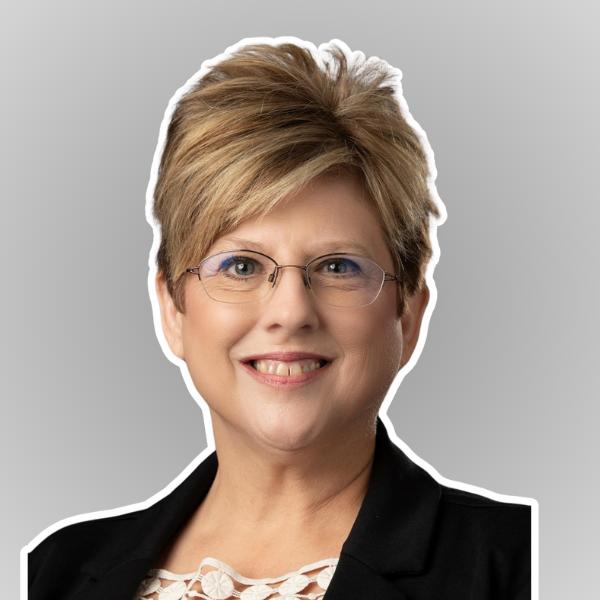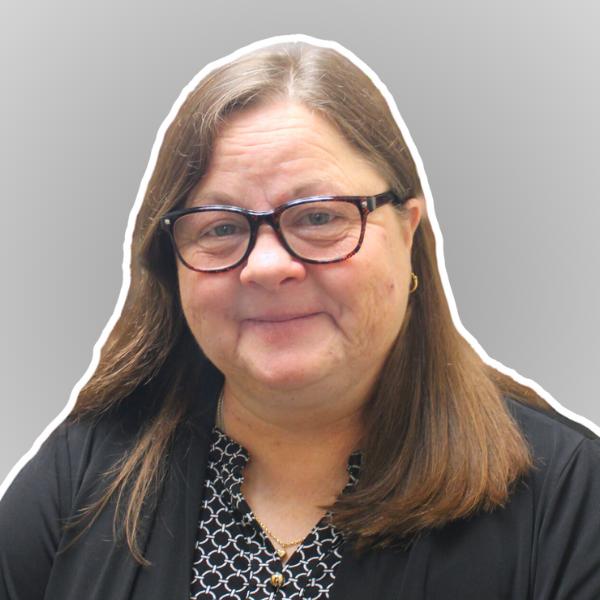
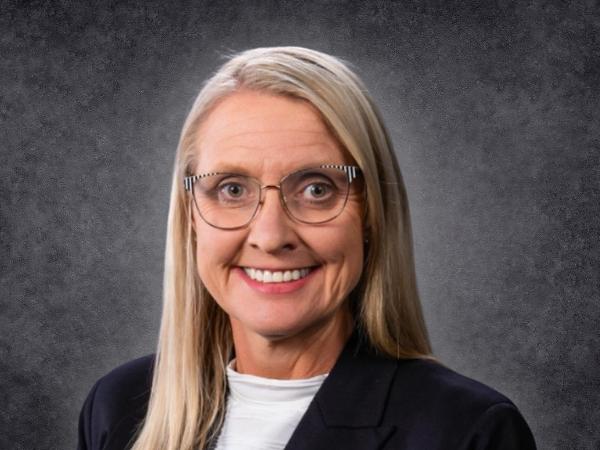



Dr. Megan Duncan Executive Director m.duncan@theaaea.org
Dr. Karla Neathery Assistant Executive Director k.neathery@theaaea.org
Sharon Chuculate Fiscal Services Coordinator s.chuculate@theaaea.org
Sarah Shamburger Business Manager s.shamburger@theaaea.org
Alyse Mattox Communications & Technology Specialist a.mattox@theaaea.org
Melanie Thrasher Business Analyst m.thrasher@theaaea.org
Lana Webb Membership & Certification Coordinator l.webb@theaaea.org
Molly Franxman Administrative Assistant m.franxman@theaaea.org
Mike Mertens Consultant m.mertens@theaaea.org
Lenett Thrasher Consultant l.thrasher@theaaea.org
AAGEA Conference, October 1-2, 2025 Benton Event Center
CASBO Classes, October 29-30, 2025
UCA Brewer-Hegeman Conference Center
AAEA Fall Conference, November 13, 2025 Benton Event Center
AASA Superintendent Symposium, January 21-22, 2026
DoubleTree Hotel, Little Rock
AASBO Conference, February 11-12, 2026 Hot Springs Convention Center
TEL-AR Conference, February 18-19, 2026
Wyndham Riverfront Hotel, North Little Rock
ArkASPA Spring Conference, February 23-24, 2026
Wyndham Riverfront Hotel, North Little Rock
AACIA Conference, March 3, 2026 Benton Event Center
Women in Leadership Conference, April 15-16, 2026 Robinson Center, Little Rock
CASBO Classes, April 22-23, 2026
UCA Brewer-Hegeman Conference Center
AACTEA/ACTE Region IV Joint Conference, April 29-May 1, 2026
Embassy Suites, Rogers
AAFC Spring Conference, April 29-May 1, 2026
Hot Springs Convention Center
AASEA Conference, June 9-10, 2026
Benton Event Center
AAEA Summer Conference, July 27-29, 2026
Statehouse Convention Center/Marriott Hotel
For more information, visit theaaea.org/events.
Charles Warren AAEA President Chief Financial Officer, Fort Smith
Dr. Debbie Bruick-Jones AASA President Superintendent, Bentonville
Shavon Jackson AAESP President-Elect Principal, Russellville
Melissa Powell ArkASPA President Assistant Superintendent & Director of HR, El Dorado
Justin Robertson AASBO Past President Chief Financial Officer, Russellville
Molly Davis AAMLA President Principal, Rogers
Dr. Megan Duncan AAEA Executive Director
Dr. Jason Reeves AAEA President-Elect and AASSP Past President Superintendent, Mountainburg
Dr. Jeremy Owoh AASA President-Elect Superintendent, Jacksonville/ North Pulaski
Steven Helmick AAESP Past President Principal, Little Rock
Shantele Raper AACTEA President Assistant Superintendent, Rivercrest
Domonique Alexander AASEA President Special Education Supervisor, Fort Smith
Randall Bolinger ASPMA President (until Oct) Maintenance/Facilities Supervisor, Siloam Springs
Dr. Jared Cleveland AAEA Secretary Superintendent, Springdale
Dr. Karen Walters AASA Secretary Superintendent, Bryant
Jason Selig AASSP President Director of Instruction, Lake Hamilton
Lea Metcalf-McDonald AAFC President Executive Director of Curriculum, Texarkana
Dr. Kelli Martin AACIA President DeputyGreenbrierSuperintendent,
Raymond Reynolds ASPMA President (begin Oct) Maintenance/Facilities Supervisor, Searcy
Stacy DeFoor
AAEA Past President Assistant Superintendent, Sheridan
Betsy Laughter AAESP President Principal, Marion
Charles Nelson AASSP President-Elect Principal, Greene County Tech
Pam McCammon AASBO President BusinessGreenbrierManager,
Valerie King AAGEA President Director of Gifted Programs, Siloam Springs
B.J. TEL-ARBurgessPresident Director of GreenbrierTechnology,
Presidential
American Fidelity Assurance Co.
Bailey Education Group
Curriculum Associates
Educational Benefits
Lifetouch National School Studios
NIET - National Institute for Excellence in Teaching Solution Tree
Prestigious Cognia
Renaissance Learning
Stephens
Distinguished Apptegy
Arkansas Army National Guard
Capturing Kids’ Hearts
Coryell Roofing and Construction
Lexia Learning
The Kirkland Group
Diamond
Amazon Business
Baldwin & Shell
Conscious Discipline
First Security Beardsley
Imagine Learning
Modern Classrooms Project
OnToCollege
Phoenix Contractors
Platinum
AAMSCO
Architecture Plus
Arkansas Public Safety Solutions
C.R. Crawford Construction
Energy Systems Group
ESS
Hight Jackson Associates PA
HMH | NWEA
Just Right Reader
Legacy
Construction Management
Nabholz | Entegrity Energy Partners
Polk Stanley Wilcox Architects
Powers of Arkansas
Progressive Technologies
Pro Service Builders
Reach University
TRANE
Gold
CDI Contractors
Cromwell Architects Engineers
Cynergy Rehab Group Goalbook
IXL Learning
Kinco Constructors
Middleton Heat and Air
Paragon Architecture
Red Comet
TIPS The Interlocal Purchasing System
White River Services and Solutions
WIlson Language Training
Silver
American Bus Sales
Correll
French Architects, PA
K12 Tutoring
My Benefits Channel
SEAS
SmartData All-In-One Strategos Group

Dr. Megan Duncan, AAEA Executive Director
Across Arkansas schools, leaders are developing the opportunity to attract, retain, and support the educators who make learning possible for our children. Dedicated teachers in classrooms and leaders in buildings work tirelessly to meet student needs and build the pipeline of available leaders for the future.
Arkansas, like many states, faces the need for continued development of teacher and leadership recruitment and retention. Working as a team to develop and encourage graduates to explore the offerings in education provides a great opportunity and partnership with the higher education community.

We must work together to build a thriving educator workforce and pursue bold and practical solutions. Districts and policymakers must join forces to ensure policy reflects the demands and needs of the profession. This includes special attention to high-need areas, rural placements, and advanced credentials. A positive and collaborative school and community culture is a key factor in retention. Leaders play a central role in creating environments where educators feel safe, respected, and encouraged to innovate.
Strong collaboration between school leaders, teacher preparation programs, and partnership agencies is necessary to provide quality professional learning and support. High school career pathways, growyour-own models, executive coaching, and residency programs can help provide a diverse and local pipeline of future teachers and leaders.
Support in the first years of teaching and leadership development makes a measurable difference. Structured mentoring, executive coaching, and time for collaboration and partnership development help leaders and teachers grow in both confidence and competence. It is essential to recognize excellence and provide growth within instructional settings.
The responsibility to elevate the profession belongs to each of us from district and school leaders, school board members, legislators, higher education partners, and community leaders. By working together, we can build a workforce to reflect the values of Arkansas and the potential of our students. AAEA remains committed to advocating for systemic improvements, sharing promising practices, and empowering our members to lead with clarity and purpose.
Dr. Karla Neathery, AAEA Assistant Executive Director

The law has changed on school board meetings and member information on district websites. What are we required to post on our website?
Act 120 and Act 505 requires that the following information be posted to the district website:
• Agendas for all regular meetings: At least three days (3) days in advance
• Agendas for all special meetings: At least two (2) hours in advance
• Board Meeting Minutes: Within twenty-four (24) hours of the minutes being approved
• Board Member Information: Name, Email address, Position and Term Length

Submitted by the National Institute for Excellence in Teaching
Arkansas is expanding teacher leadership with the new Master Professional Educator Designation, a role focused on high-impact classroom coaching in reading and math. This designation builds on the success of more than 1,000 lead teachers already trained and certified to mentor teacher candidates and new educators. Together, Lead and Master designations are part of the state’s strategy to accelerate student learning and ensure new teachers are supported by accomplished classroom leaders.
Both designations are recognized by the Division of Elementary and Secondary Education (DESE) as pathways to meet licensure requirements for educators who mentor new teachers. They are also supported through the state’s merit pay system, enabling Lead and Master teachers to earn additional compensation.
NIET is a leading pathway provider in the state, having trained more than 800 lead teachers, and is proud to continue to build educators as a provider of the new Master Teacher designation this fall. NIET’s Master Professional Educator Designation Pathway equips experienced teachers with advanced coaching and development skills. Participants will analyze student work and data, strengthen content-specific strategies in ELA and math, and build reflective coaching and support systems to bolster new educator practices. This pathway includes synchronous virtual sessions for interactive instruction, reflection, and discussion, asynchronous components for individualized, flexible learning schedules, on-site individualized coaching to support implementation and deepen leadership skills, and jobembedded field experiences.
NIET has more than 25 years of experience working in districts across the country, including supporting hundreds of educators in achieving their designations in Arkansas. The Master Designation Pathway is yet another opportunity to continue to elevate educators statewide using NIET’s proven approach in building capacity and instructional excellence, with nearly 250 educators already enrolled this school year.
Interested in learning more information on how to identify and support teachers in your district to earn the Master designation? Please contact NIET’s Central Region Director Amy Gayle at agayle@niet.org.

Charles Warren, AAEA Board President
Nobody goes to college or starts a career with a goal to someday process payroll for a living. In my career, I’ve worked with talented payroll people. Typically, they were really good at their first clerical job and someone noticed. That someone asked them to work in the payroll office. The rest is history. When you find a good one – one that is detailed, accurate, and cares – you work to keep them around.
For me, that’s Katrina Efurd. I worked with her in the “real world” and then things happened and we moved on to other jobs. As CFO, when a payroll job opened up, I begged her to work at the school district. Now she is the Payroll Coordinator on a team that pays over two thousand employees TWICE a month.
Katrina and I still talk about the nuanced differences between real world payroll and public school payroll. It took me almost a year to fully embrace that public school compensation is about contract days and not an annual salary. In the real world, I got paid holidays. At the district, I have non-contract days. Neither way is right or wrong – just different.
I recently had a payroll-related conversation with Carol Longino, Chief Financial Officer of Magnolia School District. She is the President-Elect of AASBO. As a School Business Official (SBO), she also ran payroll in the “real world” before starting at Magnolia in 2015.
Our conversation felt like a therapy session because she affirmed that the whole contract-days compensation is hard to comprehend at first, especially if you’ve processed payroll outside of public schools. Carol also shared how important it was to establish overtime rules and procedures that conform to Division of Labor (DOL) regulations. Distinguishing the difference between exempt versus non-exempt employees can be a daunting task if your school district is treating all employees in the same manner.
Basically, exempt employees are paid a salary for the work they do. An exempt employee is not paid for overtime. I learned that lesson quickly in my CPA (exempt employee) career. My first tax season included a required 65-hour work week for four weeks. No extra pay for that extra time.
As an administrator, you’ve likely experienced the same long hours without any overtime pay in your pocket. The thought is that you are paid a salary for your work (no matter how long it takes) and not for your time; therefore, you don’t get paid for your extra hours spent doing your work.
At times, exempt status for teachers seems contrary to the paid “planning period” and the stipends paid for after-school meetings. Schools and industries can have benefits, such as compensation for working after hours, but that’s an employee benefit, not a DOL regulation.
Non-exempt employees, however, are paid for their “time.” They do qualify for overtime. Overtime is required by the Fair Labor Standards Act (FLSA) for non-exempt employees. FLSA gave authority to the DOL to set rules for paying overtime and a minimum wage.
Educators are not formally trained to supervise non-exempt employees. College prepares educators to supervise and evaluate teachers and other professional (exempt) employees. There’s very little guidance provided to prepare the first year Principal for supervising non-exempt employees that may earn overtime. That’s why I try to simplify DOL regulations for administrators as much as I can. I have created a handbook on time sheets and overtime in order to provide a Principal with a resource for supervising classified employees (exempt or non-exempt). To support the Principal as the CEO of the school, my role is to help them adhere to payroll regulations, so they can focus on teaching and learning.
Carol took a similar approach when she started at Magnolia a decade ago. She established procedures to ensure overtime that was earned was actually paid. Don’t be surprised if you have a new SBO at your district and one of their first action items is to review payroll related processes and procedures to ensure that your district is compliant, just like Carol and I did.
During my therapy session with Carol, we talked about two great benefits that we enjoy as a public school employee. It may not always feel like it in the moment, but if you compare and contrast the benefits to the corporate world, the benefits are, well, beneficial.
The pension system provided by ATRS is elite. It is well funded and well managed, including a board that consists of current and retired public school employees. It is the envy of public school teachers from other states and state employees of Arkansas.
This ATRS pension is a “defined benefit plan.” I had to study a variety of pension programs because there was always a question or two about them on the CPA exam. The pension gets its name because the benefit is defined (or set). Based upon a number of factors, your retirement benefits are set. The benefits stay with you as long as you live. Since retiring in the late 1900s, my mom and dad have been enjoying these benefits for decades. My much younger brother started contributing as a teen-ager and is already eligible to retire with full benefits. More about his story next month.
You won’t see this type of pension in the corporate world. Sure, I still have the 401(k) plan I had when I worked in the “real world,” but I can still participate in supplemental retirement programs known as 403(b) and 457 plans. Carol is proud of her supplemental programs in Magnolia which do include both 403(b) and 457 plans. I was fortunate enough to be at Fort Smith when we developed these plans for our employees.
I am a big fan of our “district sponsored 403(b) plan.” We created it to fight the burdensome fees associated with many annuity programs. I created a slide show to support the idea that when employees pool retirement savings together, we can drive down program fees and keep more of our own earnings. If you ever want to see the slides, drop me a line. Maybe one day, I can incorporate both an auto-enrollment and an auto-escalation feature in our plan.
Our employee health care costs have remained steady over the last decade while public corporations are driving those costs up and reducing benefits for their employees. EBD, also known as ARBenefits, has had its ups and downs, but the network is large and the options are plentiful. I’m a classic plan guy taking advantage of health savings accounts to save taxes on medical bills. EBD also provides health insurance for retirees. That does not happen in the corporate world.
October is open enrollment month for our health insurance plan. Whether or not you make any changes, please take time to reflect on the many benefits we receive as a public school employee. When we talk about “salary and benefits,” sometimes we focus too much on salaries and forget that the benefits are an important part of our compensation as educators.
Also, take a moment to say thank you to your payroll team. They ensure you get paid in a timely manner each pay period.
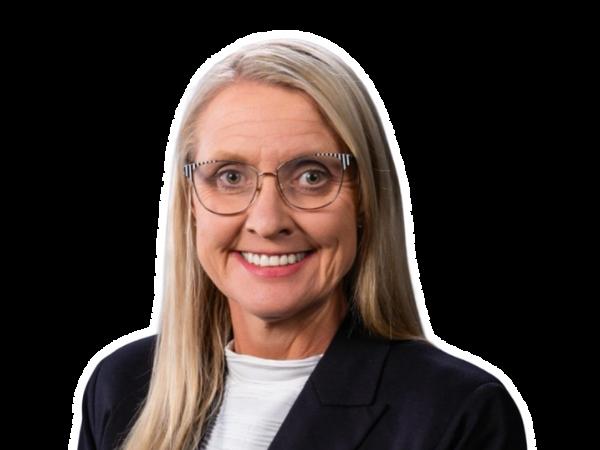
Principal, Manila High School
Dr. LeAnn Helms, Principal at Manila High School, says that from the time she was in high school, she felt called to public service. "I was deeply influenced by my teachers and coaches, who not only taught content but also modeled leadership, integrity, and resilience." Her career began at Marked Tree High School at twenty years old, after which she spent a year at Riverside. She then returned back to her hometown of Manila, where she has remained for twenty years. "I’ve been blessed to serve in several roles since then—classroom teacher, K-8 assistant principal, eight years as middle school principal, and I am starting my sixth year as 7-12 high school principal. Each step has given me a new perspective on how to best support students and teachers. I’ve worked to never lose sight of why I started in this profession: to change young people’s lives."
Dr. Helms says her favorite thing about her job is "seeing students succeed—whether it’s in academics, athletics, the arts, or through personal growth. Watching a student overcome a challenge or discover their passion is what makes the hard work worth it." One of her most significant challenges is "balancing the many demands of leadership while keeping the focus on students. Education is changing rapidly, and it takes intentional effort to protect instructional time and ensure that every decision serves kids because you are making a million decisions daily." Over her career, she says the increased role of technology has been a major shift, along with a stronger emphasis on data-driven instruction and accountability. "While those changes bring challenges, they also provide opportunities to meet students’ needs in more personalized ways. In 2004, I wrote my master's thesis on using the internet to communicate with parents, with only one-third of households reporting having access. In 2021, I wrote my dissertation on virtual and blended learning, with over 90 percent reporting having some type of internet access."
For those considering the career, she advises: "Do administration for the right reasons, not a jump in pay. If your heart is in helping students and teachers grow and you’re willing to work hard, there’s not a more rewarding career. But you have to be flexible, patient, and ready to adapt."
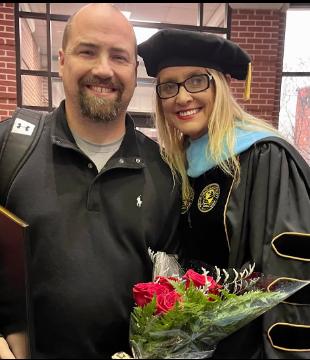


What is the best advice you have ever received?
“Do what’s best for all students, and everything else will fall into place.” That guiding principle has helped me make tough decisions with clarity and confidence.
What might other administrators be surprised to know about you?
They might be surprised to learn that my husband taught math in the same building as me for almost fifteen years while I served as administrator. Our daughter Chloe, a senior, has been with us since the 5th grade. Also, Santa Clause taught me how to drive a bus and the band is yet to teach me how to play the cowbell.
What is the most daring thing you’ve done?
As a new high school principal during COVID, I feel like I spent my first two years at the high school just trying to survive.

What’s something that amazes you?

I am continually amazed by students' resilience. No matter what obstacles they face, they have the capacity to rise above and achieve when pushed and held accountable.
What do you feel is your greatest professional accomplishment?
Protecting the rich traditions set forth years before I became principal, while building upon a rich tradition of educational excellence.
What do you enjoy doing during your time off?
I enjoy spending time with my family, cheering on MHS athletics, and supporting community events. I love to play golf with my husband on Saturday and watch Chloe play basketball on Mondays and Thursdays during the session.
What is one of the things on your “Bucket List?”
To see all 50 states. We will do this when our vacation time is not limited to the 2-week dead period.
When people look back at your life, how do you want to be remembered?
As someone who loved her students, had time for parents, worked hard for her community, and bled black and gold.
What do you see as the biggest benefit of AAEA membership?
I enjoy the networking and professional opportunities. I have had the chance to mentor and serve while being served. I also know the legal protection in tough situations.












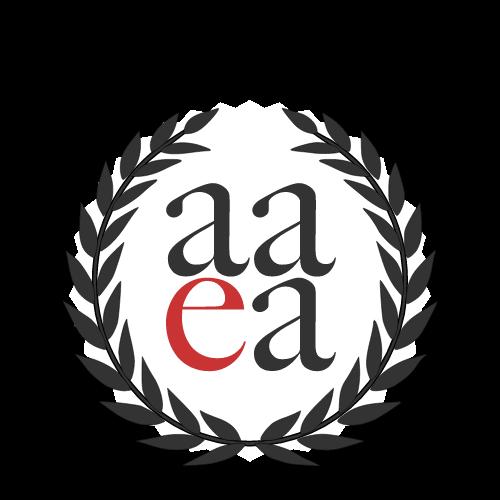
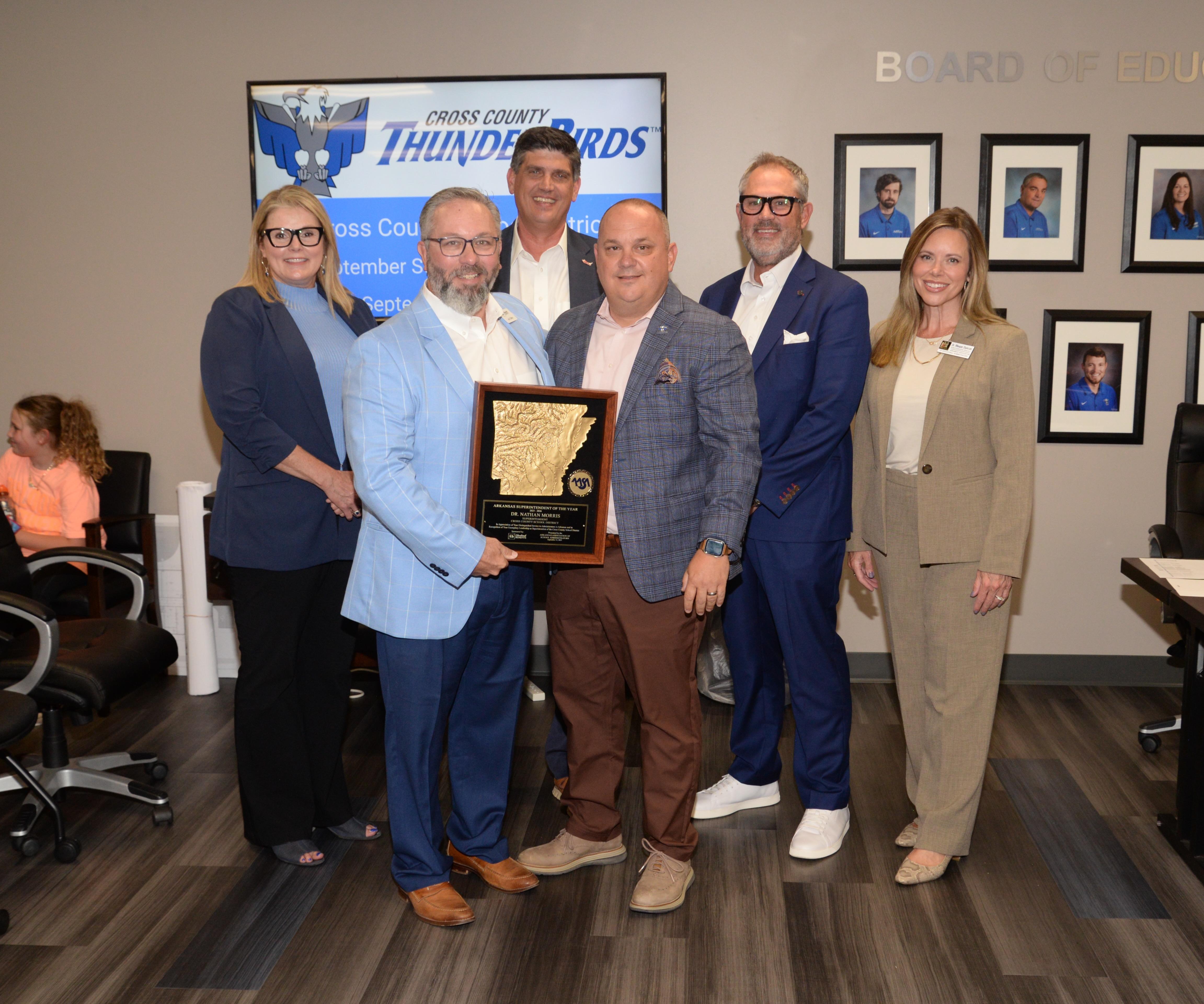
Dr. Nathan Morris, Superintendent of Cross County School District, was recently presented with the 2026 Arkansas Superintendent of the Year Award. This award is sponsored by Educational Benefits, Inc. Dr. Megan Duncan, Executive Director of the Arkansas Association of Educational Administrators (AAEA), and Jon Collins, Educational Benefits, Inc., presented him with the award at the Cross County School District on September 15.
Dr. Nathan Morris is in his ninth year as Superintendent of Cross County School District and brings more than 14 years of experience as an educator in Arkansas. He is a dedicated advocate for both students and teachers, working to close achievement and behavioral gaps associated with poverty, build strong student character, and ensure equitable access to highly effective teachers. View the full press release here.

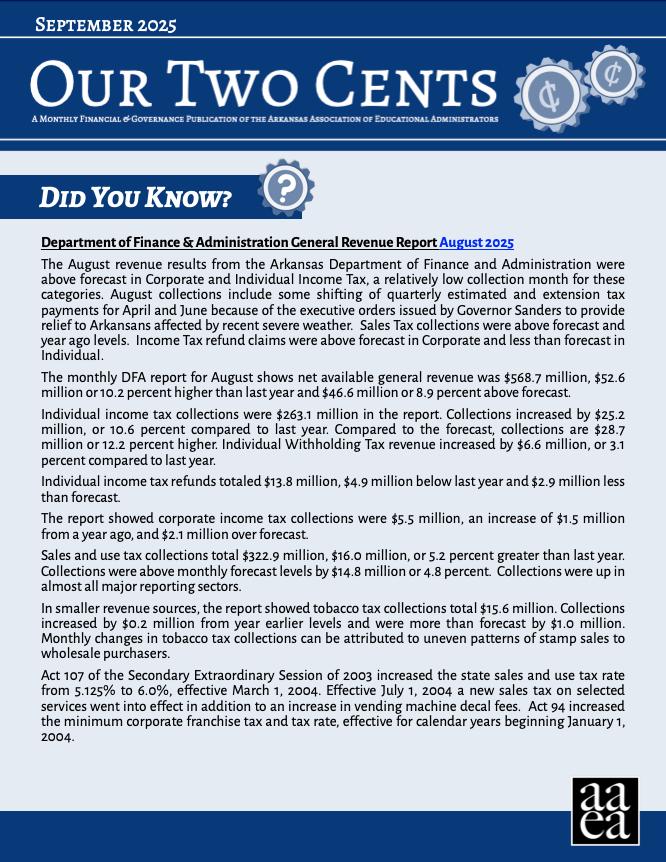
This segment features content from other AAEA publications. Our Two Cents is a monthly publication available to subscribing districts. The following excerpt comes from the September 2025 issue.
The August revenue results from the Arkansas Department of Finance and Administration were above forecast in Corporate and Individual Income Tax, a relatively low collection month for these categories. August collections include some shifting of quarterly estimated and extension tax payments for April and June because of the executive orders issued by Governor Sanders to provide relief to Arkansans affected by recent severe weather. Sales Tax collections were above forecast and year ago levels. Income Tax refund claims were above forecast in Corporate and less than forecast in Individual.
The monthly DFA report for August shows net available general revenue was $568.7 million, $52.6 million or 10.2 percent higher than last year and $46.6 million or 8.9 percent above forecast.
Individual income tax collections were $263.1 million in the report. Collections increased by $25.2 million, or 10.6 percent compared to last year. Compared to the forecast, collections are $28.7 million or 12.2 percent higher. Individual Withholding Tax revenue increased by $6.6 million, or 3.1 percent compared to last year.
Individual income tax refunds totaled $13.8 million, $4.9 million below last year and $2.9 million less than forecast.
The report showed corporate income tax collections were $5.5 million, an increase of $1.5 million from a year ago, and $2.1 million over forecast.
Sales and use tax collections total $322.9 million, $16.0 million, or 5.2 percent greater than last year. Collections were above monthly forecast levels by $14.8 million or 4.8 percent. Collections were up in almost all major reporting sectors.
In smaller revenue sources, the report showed tobacco tax collections total $15.6 million. Collections increased by $0.2 million from year earlier levels and were more than forecast by $1.0 million. Monthly changes in tobacco tax collections can be attributed to uneven patterns of stamp sales to wholesale purchasers.
Act 107 of the Secondary Extraordinary Session of 2003 increased the state sales and use tax rate from 5.125% to 6.0%, effective March 1, 2004. Effective July 1, 2004 a new sales tax on selected services went into effect in addition to an increase in vending machine decal fees. Act 94 increased the minimum corporate franchise tax and tax rate, effective for calendar years beginning January 1, 2004.
The additional revenues are deposited as special revenues to the Educational Adequacy Fund to be used to fulfill the financial obligations of the state to provide an adequate educational system. In August 2025, $66.3 million was collected and deposited to the fund. After deductions, the net amount is $64.4 million. The monthly collection is equivalent to a 5.7 percent increase from prior year collections.
Interested in more from Our Two Cents? Contact our office at 501-372-1691.

The AAEA Job Board is a calendar-year subscription that assists districts with the ever-increasing challenge of recruiting quality staff. It is a significant resource for educators, both in-state and out-of-state, seeking employment in Arkansas schools.
Over 165 school districts are participating in the program, which has been extremely helpful to schools and educators over the years. The site is used year-round and is accessed extensively during the second semester. It is not unusual to see over 400 jobs posted on the Job Board at one time. With an account, school districts may post unlimited job vacancies throughout the year.
To subscribe (by district) or to post job openings, contact Lana Webb, Administrative Specialist, at l.webb@theaaea.org or at 501-372-1691.
CoSN is a great resource for school
for links to articles to assist technology leaders as they navigate through





